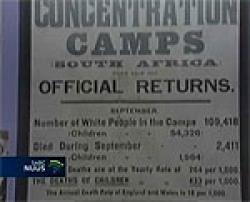
Published date
20 December 1900
The arrival of Lord Kitchener and Lord Roberts, with the latter taking up the role of Supreme Commander of British forces in 1900 helped turn the tide in the Anglo-Boer War. In the early stages of the war, the Boer Commandos were scoring important victories over British forces. Several British garrisons in the Cape, Mafikeng and Natal had come under siege and subsequent attempts to relieve them ended disastrously for the British forces. The Colonial Office sent Roberts and Kitchener along with reinforcements of up to 180 00 troops. The impact of these reinforcements was immediate. Roberts managed to relieve all the garrisons, and in June 1900 entered and took control of Pretoria. This, the British had hoped, would bring the Boer Republics to their knees. So confident were they that Roberts was allowed to return to Britain, handing over the command of British forces to Lord Kitchener. To their chagrin, the Boers embarked on a campaign of guerrilla warfare, attacking key military installations in territories held by the British. And clearly, the Anglo-Boer war was far from over. Kitchener realised that the success of the Boers depended heavily on the support they received from the civilian populations, mainly women and children. He proposed the establishment of concentration camps around the country where Afrikaaner children and women were to be confined. At the end of the war, 27 000 Afrikaaner women and children had perished. Most historians observe that this is the one single incident that inspired the rise and growth of Afrikaaner Nationalism, whose ultimate triumph was realised with the Nationalist Party (NP) seizing power in the elections of 1948.
References
Giliomee, H and Mbenga, B (2007) A New History of South Africa. Cape Town|SAHO Lord A. Kitchener [online] Available at: www.sahistory.org.za [Accessed on 3 December 2013]